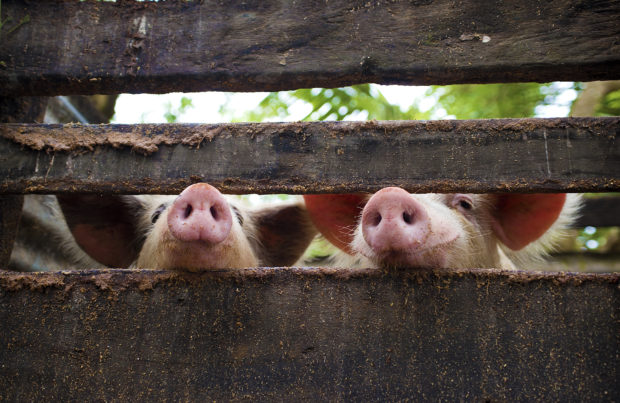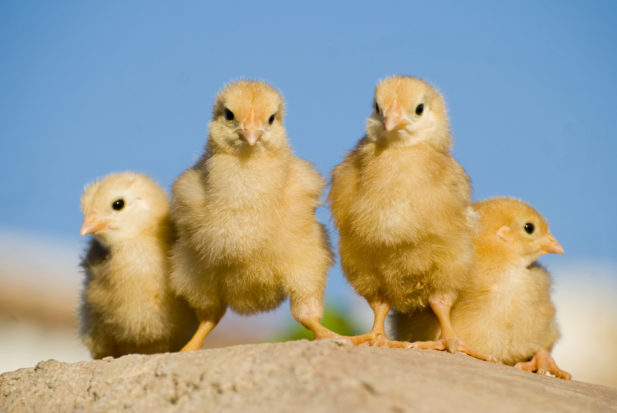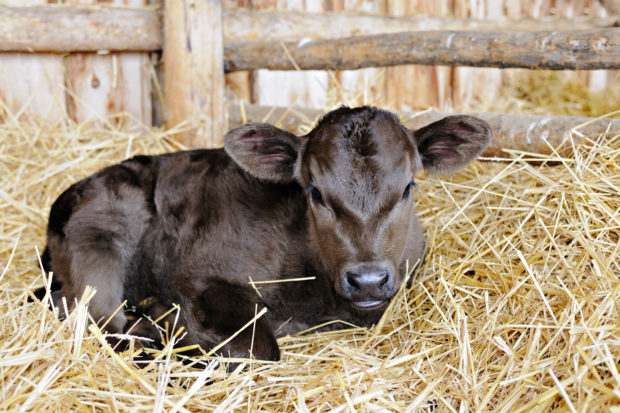Each December, I write a series of blogs running through the big accomplishments of the year for The HSUS, Humane Society International, and other affiliates, by area of focus. Today, I offer the first in this series, covering the blaze of progress for farm animals.

We stifled “Right to Farm” constitutional amendments across the country. If passed, these measures would’ve made it nearly impossible to enact restrictions on what factory farming corporations can do to animals, workers, and the environment. Photo by iStockphoto
When I started as CEO of The HSUS in 2004, our movement had made little progress on the public or corporate policy level regarding the treatment of animals in food production. Now, more than a decade later, we are on a trajectory to end the extreme confinement of animals on factory farms and we are pressing ahead with reforms in other domains. It’s been a year of remarkable corporate policy reforms, major farm animal ballot wins in Massachusetts and Oklahoma, and important lawsuits that affirmed our right not only to make state law but to gather information and share it with the public.
Winning Massachusetts Question 3
Along with state and national allies, we won Question 3, a Massachusetts ballot measure banning the sale and production of eggs, veal, and pork from animals confined in cages. The important measure passed with an overwhelming 78 percent of the vote, a greater margin than any animal protection ballot measure in history. We won majorities in every county, every congressional district, and 347 of 351 towns and cities in the state. In the courts, we’ve also successfully defended the right of states to adopt these sorts of standards, with a recent ruling by the 9th Circuit Court of Appeals tossing out a lawsuit from a group of state governors and attorneys general who sought to overturn a similar California law we worked to pass in 2010.
Creating a cage-free future
We worked with virtually all the major food companies — that hadn’t yet addressed the issue of battery cages in their supply chain — to announce timelines for switching to cage-free eggs. The impressive list includes Walmart, Kroger, Kraft Heinz, Safeway, and dozens more. These pledges have had a game-changing effect on the egg industry. Because of our success, as an NPR headline touted, “Most U.S. Egg Producers Are Now Choosing Cage-Free Houses.”
We have worked with virtually all the major food companies to announce timelines for switching to cage-free eggs. Photo by iStockphoto
Winning for broiler chickens
For the first time in our movement’s history, we’ve been able to achieve important corporate policy wins for broiler chickens (those raised for meat). We worked with Perdue—the fourth largest poultry producer in the United States—along with Compass Group and Aramark, two of the world’s largest food service companies (serving tens of millions of meals each day) to address some of the key concerns regarding the suffering these birds endure, including rapid growth rates, living conditions, stocking density, and slaughter.
Global progress for farm animals
In 2016, Humane Society International garnered a string of corporate policy commitments that will relieve tens of millions of animals from a lifetime of intensive confinement in the coming years. We convinced two of the world’s largest food service providers, five of Latin America’s largest restaurant operators, a major fast food chain in South Africa, two Mexican restaurant chains, and several major Canadian retailers to phase out battery cages from their supply chains, with some companies pledging to eliminate gestation crates at the same time. These companies include McDonald’s, Burger King, Compass Group, and Grupo Alsea. In collaboration with local groups in Brazil, HSI is helping two new school districts adopt Meatless Monday, and one city to ban foie gras. In South Africa, the Government of the Western Cape’s Health Department has joined our Green Monday campaign as part of its wellness program, and is now promoting more plant-based eating.
More institutions enacting meat reduction strategies
As Politico reported this year, “The Humane Society of the United States is hitting the meat industry where it hurts: They’re convincing cooks to reduce the amount of meat from their menu.” We persuaded 26 school districts, including Atlanta Public Schools, Baltimore City Public Schools, and Hillsborough County Schools in Florida (the eighth largest district in the United States), eight universities, five hospitals, several private schools, and the Head Start agency of the Monterey County school district in California, enact policies to reduce their meat purchases. We’ve also staged 46 of our Food Forward events and Culinary Experience trainings, where we’ve taught more than 1,300 food service professionals, like chefs and directors of dining, how to create delicious and affordable plant-based meals.
Along with state and national allies, we won Question 3, a Massachusetts ballot measure banning the sale and production of eggs, veal, and pork from animals confined in cages. Photo by iStockphoto
Took on “Right to Harm” and “ag-gag”—and won
We stifled “Right to Farm” constitutional amendments across the country—from Nebraska to Indiana to Oklahoma, where we defeated a ballot measure by more than 20 points. If passed, these measures – better described as “Right to Harm” proposals — would’ve made it nearly impossible to enact restrictions on what factory farming corporations can do to animals, workers, and the environment. We also helped thwart a dangerous “ag-gag” bill in Tennessee, along with anti-animal protection measures in Arizona, Massachusetts, and West Virginia.
Unprecedented media coverage on farm animals
In years past, animal abuses were often hidden behind the closed doors of factory farms. Not anymore. Prominent news outlets like the Washington Post, CBS News, USA Today, NPR, Slate, Wired, Politico, and others are covering our work for farm animals. Quartz devoted an entire feature to the farm animal movement’s remarkable progress over the years, stating that at “the core of the pragmatic effort is the Humane Society of the United States, which has managed to consolidate enough political power to leave its fingerprints on public and corporate policy changes across the federal, state, and local levels.” In an article this week, the Chronicle of Philanthropy detailed the work that The HSUS has done to usher in unprecedented change for all animals, including farm animals.
Federal government wins
This is also a year when the Obama Administration closed a loophole allowing downer veal calves to be set aside and left to linger rather than requiring immediate euthanasia, years after The HSUS brought national attention to this issue with a pair of damning investigations and a legal petition exposing appalling mistreatment of juvenile animals too sick, injured, or weakened to walk on their own to slaughter. The administration not only granted our petition, they did so for the humane-focused reasons we stated in the petition. The Obama Administration is also poised to finalize a rule that would dramatically upgrade animal welfare standards for animal products labeled as “organic.”
While we are making tremendous progress in reducing the suffering, our work is far from done. In the new year, The HSUS and HSI will continue to work hard and keep up the trajectory of progress for farm animals, with passion, purpose, and the strategic vision that you’ve come to expect of us.
The post Remarkable gains for farm animals in 2016 appeared first on A Humane Nation.
Enviroshop is maintained by dedicated NetSys Interactive Inc. owners & employees who generously contribute their time to maintenance & editing, web design, custom programming, & website hosting for Enviroshop.


